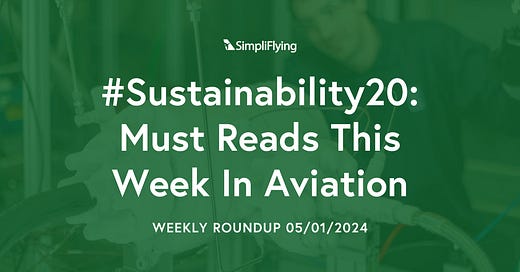#Sustainability20: Rolls-Royce Kicks Off Liquid Hydrogen Fuel Pump Testing For easyJet Aircraft System & More
Weekly Roundup - 05/01/24
Each Friday, we publish a round-up of the 20 most important stories on sustainable aviation. You can see previous editions of #Sustainability20 here.
Industry Updates
Airfares likely to remain high in 2024 amid aviation's green push and strong demand - The National
Airfares, inflated by operational costs, sustainable fuel use, inflation, geopolitical tensions, and supply issues, are expected to stay high for years, experts predict.
Amsterdam’s Schiphol Airport increases 2024 capacity after cuts reversal - Airport Technology
Amsterdam's Schiphol Airport will increase its 2024 summer capacity to 293,000 flights, totalling 483,000 annually, after the Netherlands dropped plans to cut flights following EU and airline opposition.
Once dismissive, a major Irish farmer and Ryanair head now acknowledges climate change concerns. Despite ordering efficient planes, O'Leary doubts decarbonisation through taxation, criticising the focus on airlines over shipping for CO2 emissions.
Uncertainty on SAF tax subsidy remains as agencies update carbon calculations - Agri-Pulse
The Biden administration is advancing a tax subsidy for SAF using agricultural commodities, with pending details on oilseeds and corn ethanol's eligibility as feedstocks.
The man who lost faith in electric aviation - The Globe and Mail
Dominique Spragg witnessed the potential of electric aviation with Harbour Air's 2019 electric Beaver seaplane flight. The Pacific Northwest is a hub for electric aircraft development, but Spragg now views these efforts as limited "green theatre".
CLIMATE WATCH: In Europe, Trains Are Full, and More Are on the Way - The New York Times
European cities anticipate new rail connections in response to climate concerns and growing demand for cross-border rail travel. Rail infrastructure investments are underway, with passenger rail transport in the EU increasing significantly. The trend towards sustainable rail travel is expected to continue despite logistical challenges and the need for station renovations.
Infrastructure and operational efficiencies
How Delta Air Lines' New Cups Can Cut 7 Million Pounds Of Single-Use Plastic - Simple Flying
Delta Air Lines is introducing eco-friendly paper cups onboard, supporting its sustainability goals. Chief Sustainability Officer Amelie DeLuca highlights this as part of Delta's broader commitment to decarbonise and implement immediate sustainable practices.
CFM RISE on track for ground and flight tests mid-decade: GE Aerospace - Runway Girl Network
CFM International's RISE program, focusing on open-fan engine architecture, aims to reduce fuel consumption and CO2 emissions by over 20%. Launching in 2021, it's set for tests mid-decade, targeting net zero emissions by 2050 and compatibility with alternative fuels.
Prague Airport has significantly cut its CO₂ emissions, saving 59.45% since 2009. It maintained its Airport Carbon Accreditation Level 3, involving external parties, and underwent independent carbon footprint verification.
American Airlines has implemented Smart Gating, an AI-based system that optimises taxiing at airports. Launched in 2021 and tested during the Thanksgiving season, it has cut taxi times by up to 20% at Dallas Fort Worth Airport, reduced daily taxiing hours systemwide and CO₂ emissions, while also minimising gate conflicts.
Sustainable Aviation Fuel (SAF)
Firm develops jet fuel made entirely from human poo - BBC
A Gloucestershire-based aviation company has created jet fuel from human sewage, transforming waste into kerosene. Firefly Green Fuels CEO James Hygate emphasised the abundance of sewage as a feedstock. The fuel, nearly identical to fossil jet fuel, has a 90% lower carbon footprint, as confirmed by independent tests and a study with Cranfield University.
Europe, importing 80% of its used cooking oil (UCO) mainly from China, uses it largely for biodiesel in cars and trucks. With a surge in demand for UCO as a key SAF component, Transport & Environment (T&E) urges transparency to prevent palm oil misuse, noting Europe's reliance on imports due to limited local collection and production.
New York's Dimensional Energy will use $20 million funding from Microsoft, United Airlines and others to transform air pollution from a Canadian cement factory into SAF, surf wax, and vegan fat alternatives.
Dutch airport commits to new sustainable aviation fuel blend - EnvironmentJournal
The Netherlands, with Amsterdam Schipol as Europe's third busiest airport, aims for 14% SAF usage by 2030, exceeding the EU's 6% mandate. This ambitious target necessitates rapid growth in SAF implementation, challenging Dutch airports to adapt quicker than the broader EU requirement.
Production of liquid fuels from sunlight and air enabled by 3D printing - Voxel Matters
ETH Zurich engineers have developed technology to create liquid fuels from sunlight and air, first demonstrated in 2019. This carbon-neutral process involves a solar reactor using a parabolic mirror to reach 1500°C, splitting water and CO2 to produce syngas, which is then converted into fuels like kerosene. Spin-offs Climeworks and Synhelion are commercialising these technologies.
New technology: Electric and Hydrogen
Rolls-Royce kicks off liquid hydrogen fuel pump testing for easyJet aircraft system - H2 News
Rolls-Royce is developing liquid hydrogen pumps for future hydrogen-fueled aircraft propulsion systems. Partnering with easyJet, they aim to create hydrogen combustion aero engines for narrowbody aircraft, addressing the engineering challenge of pressurising low-temperature, low-pressure liquid hydrogen for combustion.
EHang’s EH216-S aircraft completed commercial flight testing - Airport Technology
EHang, a Chinese autonomous aviation technology company, has begun commercial flight testing of its EH216-S aircraft in Guangzhou and Hefei, having received Standard Airworthiness Certificates from the CAAC.
Japan Airlines is investing in hydrogen technology by partnering with H2Fly, Universal Hydrogen, and ZeroAvia to develop emissions-free passenger planes. The technology, either using hydrogen fuel cells for electricity or combusting hydrogen in engines, could convert existing jets to use hydrogen. If green hydrogen is used, flights would be carbon-free, potentially reducing greenhouse gas emissions by 88%.
A Key Electric Aviation Technology Started Testing in 2023 - CleanTechnica
Electric aviation is often overlooked in military contexts due to the high power demands of aircraft, especially high-performance ones like fighter jets. Through the X-Planes programs, novel approaches are being explored, including the X-65 CRANE (Control of Revolutionary Aircraft with Novel Effectors), which tests future technologies that could revolutionise military aviation.
NASA, Ames Research Center, and Joby Aviation are advancing the integration of air taxis and eVTOL vehicles into U.S. airports. They've developed a simulation to test air traffic management, showcased at Ames' FutureFlight Central. This collaboration aims to safely integrate air taxis into national airspace.
Australia’s first hydrogen aircraft flight set for 2024 - Asian Aviation
The IMOVE Cooperative Research Centre, Stralis Aircraft, and QUT are collaborating to integrate Australia's first hydrogen propulsion system into an aircraft, with a maiden flight planned for 2024. This project, involving retrofitting a Beechcraft Bonanza A36, is pivotal for sustainable aviation in Australia.








